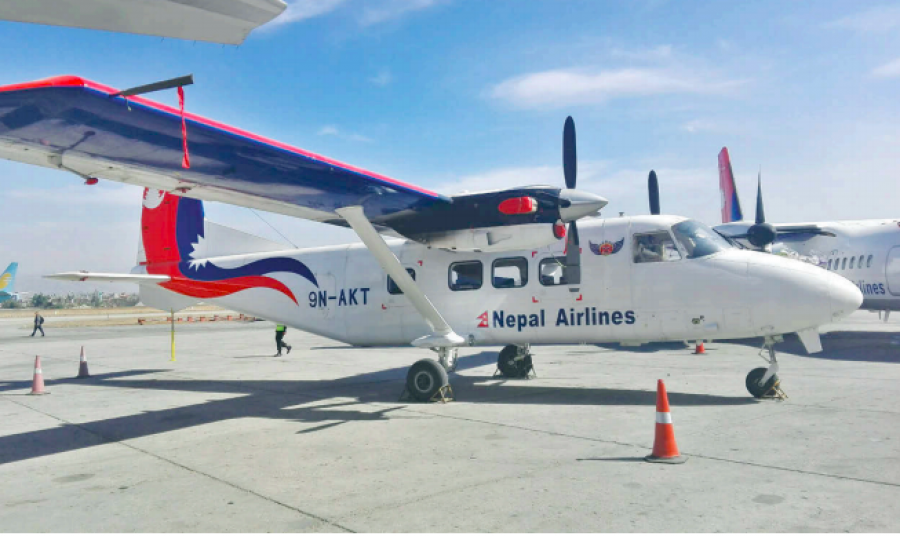Money
Nepal Airlines gives official send-off to the pilots of its Chinese aircraft
The Tourism Ministry says it will take a further decision on the grounded planes after the Finance Ministry's inputs.
Post Report
Nepal Airlines has said goodbye to the four pilots hired to fly its Chinese-made Y12e and MA60 after grounding the aircraft permanently since mid-July as they were a drain on resources.
Airline spokesperson Archana Khadka told the Post that the four captains had been employed on a contract basis, and they were given an official send-off on Tuesday. “The other pilots who are permanent employees of the airline will be assigned to other planes in the fleet.”
Since the national flag carrier will not fly the MA60 and Y12e anymore and has phased out its Boeing fleet, it now has only two types of aircraft in its fleet—Airbus and Twin Otter.
Captains Satish Bikram Shah and Rajendra Man Shakya used to fly the MA60, and Phizonath Nepali and Suraj Upadhyaya Luitel the Y12e.
Captain KB Limbu was suspended for two years for 'faulty judgement' during the approach and landing phases of the Y12e bearing registration number 9N-AKU at Nepalgunj airport on March 28.
Nepal Airlines permanently grounded its four 17-seater Y12e and two 56-seater MA60 from July 16 as per the decision of its board of directors.
A board member told the Post that the board decision was purely aimed at stemming the losses caused by the Chinese-made planes, which had reached Rs2 billion as of the last fiscal year ended mid-July, mostly in insurance and operating costs.
After having hangared the loss-making aircraft, the state-owned carrier is pondering its next move. The minutes of the decision have been sent to the Tourism Ministry for further action since the plane was purchased through a government-to-government deal.
Tourism Joint Secretary Suresh Acharya said that they have sought suggestions from the Finance Ministry which signed the agreement on behalf of the government with Exim Bank of China. “We dispatched the letter asking the Finance Ministry for its recommendation earlier this week,” he said.
Acharya said the Nepal Airlines board decision contained three options to manage the Chinese planes—sell them, lease them out or send them back to China.
“All three options, however, are not easy. They need wider consultations with the Finance Ministry and other stakeholders including the aircraft supplier AVIC as per the agreement.”
The accord also contains a clause that says that the government has to obtain the consent of AVIC, a Chinese government undertaking, for further management of the planes.
Acharya said that after receiving the Finance Ministry's input, the Tourism Ministry will take further decisions.
“The issue is complicated because Nepal Airlines decided to ground the planes without consulting the Finance Ministry.” But airline officials say a representative of the Finance Ministry sits on the company board.
In November 2012, Nepal Airlines Corporation had signed a commercial agreement with AVIC to procure six aircraft.
Subsequently, in 2013, Exim Bank of China and the Finance Ministry signed a concessional loan worth RMB 218 million for the acquisition of four aircraft—three Y-12E and one MA60. Nepal received two planes—one MA60 and one Y12e—as a gift.
As per the agreement, Nepal had decided to pay an annual interest rate of 1.5 percent and a service charge and management expenses amounting to 0.4 percent of the overall loan amount.
Nepal has been offered a seven-year grace period for repayment. This implies that Nepal will have a period of 20 years to settle the loan together with interest.
The Finance Ministry, in turn, charges Nepal Airlines an annual interest rate of 8 percent on the disbursed loan amount.
In November 2014, Harbin Aircraft Manufacturing Corporation officially handed over the first of the Y12e, with registration mark 9N-AKS, to Nepal Airlines at a ceremony held in Kathmandu.
The 56th annual audit report of the Office of the Auditor General released in April last year shows that the Chinese-made planes have been incurring heavy losses to the national flag carrier every year since they were purchased, and it had urged the corporation to make a proper plan.
On different occasions, the management has been trying to convince the government to lease out the Y12es to the Nepal Army, which is short of fixed-wing planes for emergency and rescue purposes, to get rid of the burden.
According to Acharya, the Finance Ministry had cleared all the money owed to AVIC last February.




 20.12°C Kathmandu
20.12°C Kathmandu













